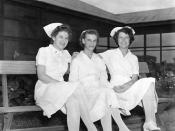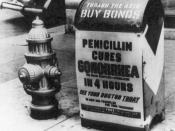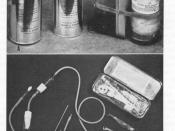World War II brought death and destruction upon the world. On the other hand, it also opened doors for pioneering developments that commonly occur during such situations of high adversity. Some of the most important advancements took place in the field of medicine when the world was embroiled in World War II. As Dr. Ralph Major states, "An army is a vast laboratory of medical research where disease and injuries are seen on a far larger scale than in peacetime. Many improvements in the treatment of infections have come from experiences on the battlefield" (Major 52). Devastation in the war left countless soldiers and civilians with life threatening injuries and diseases. This devastation and destruction, led to the innovation of the three most important medicines in history namely Penicillin, Blood plasma and Sulfanilamide. These three innovations in the field of medicine helped save thousands of soldiers in World War II and are considered to be the most important medical advancements in the war.
"Penicillin fought for the soldier as bravely as the soldier fought for his country" (www.lib.niu.edu). Out of the three innovations in medicine during World War II, penicillin undoubtedly was the most important. Penicillin was invented by Dr. Alexander Fleming in 1928 and was crucial in saving lives of soldiers on D-Day where stockpiles of penicillin were gathered in depots of England and were on hand in time for the Allied invasion of Germany (Rowland 32) . Operation Overload was the pivotal point of World War II because that was when the Allies took the offensive and attacked the German stronghold of Normandy Beach. It was estimated that 3000 lives were saved on that day with the use of Penicillin and by the time the war ended that number turned out to be over two million (www.historylearningsite.co.uk). These...


